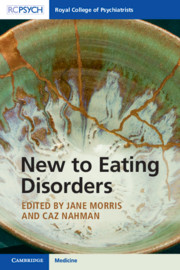Book contents
- New to Eating Disorders
- New to Eating Disorders
- Copyright page
- Contents
- Foreword
- Acknowledgements
- Introduction for Trainees and Students
- Chapter 1 What Are Eating Disorders?
- Chapter 2 Causes and Formulation
- Chapter 3 The Carer’s Perspective
- Chapter 4 Risk Assessment and Management
- Chapter 5 Ethical and Medico-legal Issues
- Chapter 6 Management of Eating Disorders
- Chapter 7 Nutritional Care: Dietetic Interventions Including Behavioural Interventions
- Chapter 8 Exercise and Activity
- Chapter 9 Body Image
- Chapter 10 Severe and Enduring Eating Disorders
- Chapter 11 Children and Adolescents
- Chapter 12 Transitions
- Index
- References
Chapter 3 - The Carer’s Perspective
Published online by Cambridge University Press: 12 June 2020
- New to Eating Disorders
- New to Eating Disorders
- Copyright page
- Contents
- Foreword
- Acknowledgements
- Introduction for Trainees and Students
- Chapter 1 What Are Eating Disorders?
- Chapter 2 Causes and Formulation
- Chapter 3 The Carer’s Perspective
- Chapter 4 Risk Assessment and Management
- Chapter 5 Ethical and Medico-legal Issues
- Chapter 6 Management of Eating Disorders
- Chapter 7 Nutritional Care: Dietetic Interventions Including Behavioural Interventions
- Chapter 8 Exercise and Activity
- Chapter 9 Body Image
- Chapter 10 Severe and Enduring Eating Disorders
- Chapter 11 Children and Adolescents
- Chapter 12 Transitions
- Index
- References
Summary
Risk assessment is a key area within looking after a patient with an eating disorder and this chapter is one of the key chapters for any trainee. Eating disorders carry high levels of physical health risk which need monitoring and managing but additionally the behavioural and psychosocial risks must not be neglected. This is one of the three core chapters identified within the book.
Keywords
- Type
- Chapter
- Information
- New to Eating Disorders , pp. 15 - 19Publisher: Cambridge University PressPrint publication year: 2020

